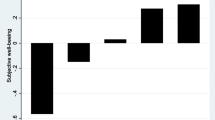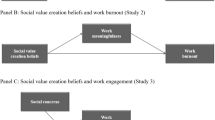Abstract
The purpose of this study is to show how autonomy, competence and meaningful work serve as mechanisms through which opportunity entrepreneurship leads to higher levels of wellbeing, and how this relationship may be altered by the country’s level of individualism. Global Entrepreneurship Monitor data for 37 countries and 14,514 individuals that are active in early stage entrepreneurship are used to investigate the relationship between opportunity entrepreneurship and wellbeing. To account for the nested nature of our data, we use a multilevel model to assess how factors of autonomy and competence as components of self-determination and meaningful work as a component of decent work mediate the opportunity entrepreneurship and wellbeing relationship. We also test the moderating effects of individualism cultural dimension at the country level on the relationship between opportunity entrepreneurship and wellbeing.



Similar content being viewed by others
References
Acs, Z. J. (1992). Small business economics: A global perspective. Challenge, 35(6), 38–44.
Acs, Z. J., Desai, S., & Hessels, J. (2008). Entrepreneurship, economic development and institutions. Small Business Economics, 31(3), 219–234. https://doi.org/10.1007/s11187-008-9135-9
Ahuvia, A. C. (2002). Individualism / Collectivism and Cultures of Happiness : A Theoretical Conjecture on the Relationship Between Consumption. Journal of Happiness Studies, 3, 23–36.
Allan, B. A., Autin, K. L., & Duffy, R. D. (2016). Self-Determination and Meaningful Work: Exploring Socioeconomic Constraints. Frontiers in Psychology, 7(February), 1–9. https://doi.org/10.3389/fpsyg.2016.00071
Allan, B. A., Batz-Barbarich, C., Sterling, H. M., & Tay, L. (2019). Outcomes of Meaningful Work: A Meta-Analysis. Journal of Management Studies, 56(3), 500–528. https://doi.org/10.1111/joms.12406
Alvarez, S. A., & Busenitz, L. W. (2001). A resource-based theory of entrepreneurship. Journal of Management, 27(6), 755–775.
Amoros, J. E., & Bosma, N. (2013). Global Entrepreneurship Monitor 2013 Global Report. https://www.gemconsortium.org/.
Amorós, J. E., Cristi, O., & Naudé, W. (2021). Entrepreneurship and subjective well-being: Does the motivation to start-up a firm matter? Journal of Business Research, 127, 389–398. https://doi.org/10.1016/j.jbusres.2020.11.044
Aparicio, S., Urbano, D., & Audretsch, D. (2016). Institutional factors, opportunity entrepreneurship and economic growth: Panel data evidence. Technological Forecasting and Social Change, 102, 45–61. https://doi.org/10.1016/j.techfore.2015.04.006
Ashforth, B. E., & Pratt, M. G. (2003). Institutionalized spirituality. Handbook of Workplace Spirituality and Organizational Performance, 93–107.
Baron, R. A. (2010). Job design and entrepreneurship: Why closer connections= mutual gains. Journal of Organizational Behavior, 31(2/3), 370–378.
Bates, D., Mächler, M., Bolker, B. M., & Walker, S. C. (2015). Fitting linear mixed-effects models using lme4. Journal of Statistical Software, 67(1). https://doi.org/10.18637/jss.v067.i01
Beynon, M. J., Jones, P., & Pickernell, D. (2016). Country-based comparison analysis using fsQCA investigating entrepreneurial attitudes and activity. Journal of Business Research, 69(4), 1271–1276. https://doi.org/10.1016/j.jbusres.2015.10.091
Binder, M., & Coad, A. (2013). Life satisfaction and self-employment: A matching approach. Small Business Economics, 40(4), 1009–1033. https://doi.org/10.1007/s11187-011-9413-9
Binder, M., & Coad, A. (2016). How Satisfied are the Self-Employed? A Life Domain View. Journal of Happiness Studies, 17(4), 1409–1433. https://doi.org/10.1007/s10902-015-9650-8
Brieger, S. A., & De Clercq, D. (2019). Entrepreneurs’ individual-level resources and social value creation goals: The moderating role of cultural context. International Journal of Entrepreneurial Behaviour and Research, 25(2), 193–216. https://doi.org/10.1108/IJEBR-12-2017-0503
Carsrud, A., & Brännback, M. (2011). Entrepreneurial Motivations: What Do We Still Need to Know? Journal of Small Business Management, 49(1), 9–26. https://doi.org/10.1111/j.1540-627X.2010.00312.x
Cordeiro, P., Paixão, P., Lens, W., Lacante, M., & Sheldon, K. (2016). Factor structure and dimensionality of the balanced measure of psychological needs among Portuguese high school students. Relations to well-being and ill-being. Learning and Individual Differences, 47, 51–60. https://doi.org/10.1016/j.lindif.2015.12.010
Cornelia, N., Sabine, S., & Fried-erike, S. (2012). Thriving at work–A diary study. Journal of Organizational Behavior, 33(4), 468.
Cueto, B., & Pruneda, G. (2017). Job Satisfaction of Wage and Self-Employed Workers. Do Job Preferences Make a Difference? Applied Research in Quality of Life, 12(1), 103–123. https://doi.org/10.1007/s11482-016-9456-9
Cummins, R. A. (1998). The second approximation to an international standard for life satisfaction. Social Indicators Research, 43(3), 307–334. https://doi.org/10.1023/A:1006831107052
De Clercq, D., Danis, W. M., & Dakhli, M. (2010). The moderating effect of institutional context on the relationship between associational activity and new business activity in emerging economies. International Business Review, 19(1), 85–101. https://doi.org/10.1016/j.ibusrev.2009.09.002
De Clercq, D., Lim, D. S. K., & Oh, C. H. (2013). Individual-level resources and new business activity: The contingent role of institutional context. Entrepreneurship: Theory and Practice, 37(2), 303–330. https://doi.org/10.1111/j.1540-6520.2011.00470.x
Deci, E. L., & Ryan, R. M. (1985). The general causality orientations scale: Self-determination in personality. Journal of Research in Personality, 19(2), 109–134.
Deci, E. L., & Ryan, R. M. (2004). Handbook of self-determination research. University Rochester Press.
Dheer, R. J. S. (2017). Cross-national differences in entrepreneurial activity: Role of culture and institutional factors. Small Business Economics, 48(4), 813–842. https://doi.org/10.1007/s11187-016-9816-8
Eisenhardt, K. M., Brown, S. L., & Neck, H. M. (2000). Competing on the entrepreneurial edge. Entrepreneurship as Strategy, 49–62.
FerDuffy, R. D., Autin, K. L., & Bott, E. M. (2015). Work volition and job satisfaction: Examining the role of work meaning and person environment. Career Development Quarterly, 63, 126–140.
Fotiadis, A., Abdulrahman, K., & Spyridou, A. (2019). The mediating roles of psychological autonomy, competence and relatedness on work-life balance and well-being. Frontiers in Psychology, 10(MAY), 1–7. https://doi.org/10.3389/fpsyg.2019.01267
Fritz, C., Lam, C. F., & Spreitzer, G. M. (2011). It’s the little things that matter: An examination of knowledge workers’ energy management. Academy of Management Perspectives, 25(3), 28–39.
Gartner, W. B. (1988). “Who is an entrepreneur?” is the wrong question. American Journal of Small Business, 12(4), 11–32.
Hayes, A. F., & Rockwood, N. J. (2017). Regression-based statistical mediation and moderation analysis in clinical research: Observations, recommendations, and implementation. Behaviour Research and Therapy, 98, 39–57. https://doi.org/10.1016/j.brat.2016.11.001
Haynie, J. M., Shepherd, D. A., & Patzelt, H. (2012). Cognitive Adaptability and an Entrepreneurial Task: The Role of Metacognitive Ability and Feedback. Entrepreneurship: Theory and Practice, 36(2), 237–265. https://doi.org/10.1111/j.1540-6520.2010.00410.x
Hayton, J. C., George, G., & Zahra, S. A. (2002). National Culture and Entrepreneurship : A Review of Behavioral Research. Entrepreneurship Theory and Practice, 26(4), 33–52. https://doi.org/10.1177/104225870202600403
Hessels, J., Van Gelderen, M., & Thurik, R. (2008). Drivers of entrepreneurial aspirations at the country level: The role of start-up motivations and social security. International Entrepreneurship and Management Journal, 4(4), 401–417. https://doi.org/10.1007/s11365-008-0083-2
Hofstede, G. H., & Hofstede, G. (2001). Culture’s consequences: Comparing values, behaviors, institutions and organizations across nations. Sage.
Hoogendoorn, B. (2016) The Prevalence and Determinants of Social Entrepreneurship at the Macro Level. 54 278 296 https://doi.org/10.1111/jsbm.12301.
Hox, J., Moerbeek, M., & van de Schoot, R. (2010). Multilevel Analysis: Techniques and Applications (Second). Routledge.
ILO. (n.d.). Decent work. Retrieved April 3, 2021, from https://www.ilo.org/global/topics/decent-work/lang--en/index.htm
Kara, A., & Petrescu, M. (2018). Self-Employment and its Relationship to Subjective Well-Being. International Review of Entrepreneurship, 16(1), 115–140. 1575
Kasser, T. (2000). Two versions of the American dream: Which goals and values make for a high quality of life? In Advances in quality of life theory and research (pp. 3–12). Springer.
Kasser, T., & Ryan, R. M. (2001). Be careful what you wish for: Optimal functioning and the relative attainment of intrinsic and extrinsic goals.
Kasser, T., Ryan, R. M., Zax, M., & Sameroff, A. J. (1995). The relations of maternal and social environments to late adolescents’ materialistic and prosocial values. Developmental Psychology, 31(6), 907.
Keller, H. (2016). Psychological autonomy and hierarchical relatedness as organizers of developmental pathways. Philosophical Transactions of the Royal Society B: Biological Sciences, 371(1686). https://doi.org/10.1098/rstb.2015.0070
Larsson, J. P., & Thulin, P. (2019). Independent by necessity? The life satisfaction of necessity and opportunity entrepreneurs in 70 countries. Small Business Economics, 53(4), 921–934. https://doi.org/10.1007/s11187-018-0110-9
Lazarus, R. S., & Folkman, S. (1984). Stress, appraisal, and coping. Springer publishing company.
LePine, J. A., Podsakoff, N. P., & LePine, M. A. (2005). A meta-analytic test of the challenge stressor–hindrance stressor framework: An explanation for inconsistent relationships among stressors and performance. Academy of Management Journal, 48(5), 764–775.
Lips-Wiersma, M., & Morris, L. (2009). Discriminating between “meaningful work” and the “management of meaning.” Journal of Business Ethics, 88(3), 491–511. https://doi.org/10.1007/s10551-009-0118-9
Lips-Wiersma, M., & Wright, S. (2012). Measuring the Meaning of Meaningful Work: Development and Validation of the Comprehensive Meaningful Work Scale (CMWS). Group and Organization Management, 37(5), 655–685. https://doi.org/10.1177/1059601112461578
May, D. R., Gilson, R. L., & Harter, L. M. (2004). The psychological conditions of meaningfulness, safety and availability and the engagement of the human spirit at work. Journal of Occupational and Organizational Psychology, 77(1), 11–37. https://doi.org/10.1348/096317904322915892
McGrath, R. G., & MacMillan, I. C. (2000). The entrepreneurial mindset: Strategies for continuously creating opportunity in an age of uncertainty (Vol. 284). Harvard Business Press.
Morris, M. H., Avila, R. A., & Allen, J. (1993). Individualism and the modern corporation: Implications for innovation and entrepreneurship. Journal of Management, 19(3), 595–612.
Mueller, S. L., & Thomas, A. S. (2001). Culture and entrepreneurial potential: A nine country study of locus of control and innovativeness. Journal of Business Venturing, 16(1), 51–75. https://doi.org/10.1016/S0883-9026(99)00039-7
Myers, D. G., & Diener, E. (1995). Who is happy? Psychological Science, 6(1), 10–19.
Nikolaev, B., Boudreaux, C. J., & Wood, M. (2020). Entrepreneurship and Subjective Well-Being: The Mediating Role of Psychological Functioning. Entrepreneurship: Theory and Practice, 44(3), 557–586. https://doi.org/10.1177/1042258719830314
Nikolova, M. (2019). Switching to self-employment can be good for your health. Journal of Business Venturing, 34(4), 664–691. https://doi.org/10.1016/j.jbusvent.2018.09.001
Pinillos, M. J., & Reyes, L. (2011). Relationship between individualist-collectivist culture and entrepreneurial activity: Evidence from Global Entrepreneurship Monitor data. Small Business Economics, 37(1), 23–37. https://doi.org/10.1007/s11187-009-9230-6
Reynolds, P., Bosma, N., Autio, E., Hunt, S., De Bono, N., Servais, I., Lopez-Garcia, P., & Chin, N. (2005). Global entrepreneurship monitor: Data collection design and implementation 1998–2003. Small Business Economics, 24(3), 205–231. https://doi.org/10.1007/s11187-005-1980-1
Rockwood, N. J. (2017). Advancing the formulation and testing of multilevel mediation and moderated mediation models. 1–176.
Rosso, B. D., Dekas, K. H., & Wrzesniewski, A. (2010). On the meaning of work: A theoretical integration and review. Research in Organizational Behavior, 30(C), 91–127. https://doi.org/10.1016/j.riob.2010.09.001
Ryan, R. M., & Deci, E. L. (2000). Self-determination theory and the facilitation of intrinsic motivation, social development, and well-being. American Psychologist, 55(1), 68.
Ryan, R. M., & Deci, E. L. (2011). A self-determination theory perspective on social, institutional, cultural, and economic supports for autonomy and their importance for well-being. In Human autonomy in cross-cultural context (pp. 45–64). Springer.
Ryff, C. D. (2019). Entrepreneurship and eudaimonic well-being: Five venues for new science. Journal of Business Venturing, 34(4), 646–663. https://doi.org/10.1016/j.jbusvent.2018.09.003
Samli, A. C. (2008). Entrepreneurship economic development and quality of life in third-world countries. Applied Research in Quality of Life, 3(3), 203–213. https://doi.org/10.1007/s11482-009-9056-z
Shane, S. (1993). Cultural influences on national rates of innovation. Journal of Business Venturing, 8(1), 59–73.
Sheldon, K. M., Ryan, R., & Reis, H. T. (1996). What Makes for a Good Day? Competence and Autonomy in the Day and in the Person. Personality and Social Psychology Bulletin, 22(12), 1270–1279. https://doi.org/10.1177/01461672962212007
Shir, N., Nikolaev, B. N., & Wincent, J. (2019). Entrepreneurship and well-being: The role of psychological autonomy, competence, and relatedness. Journal of Business Venturing, 34(5), 105875. https://doi.org/10.1016/j.jbusvent.2018.05.002
Song, C., Park, K.M., Kim, Y. (2020) Socio-cultural factors explaining technology-based entrepreneurial activity: Direct and indirect role of social security Technology in Society 101246 https://doi.org/10.1016/j.techsoc.2020.101246
Spreitzer, G., Sutcliffe, K., Dutton, J.E., Sonenshein, S., Grant, M (n.d.). i in. 2005 A socially embedded model of thriving at work. Organization Science 16 5 537
Steger, M. F., Dik, B. J., & Duffy, R. D. (2012). Measuring Meaningful Work: The Work and Meaning Inventory (WAMI). Journal of Career Assessment, 20(3), 322–337. https://doi.org/10.1177/1069072711436160
Stephan, U. (2018). Entrepreneurs’ mental health and well-being: A review and research agenda. Academy of Management Perspectives, 32(3), 290–322.
Sternberg, R., & Wennekers, S. (2005). Determinants and effects of new business creation using global entrepreneurship monitor data. Small Business Economics, 24(3), 193–203. https://doi.org/10.1007/s11187-005-1974-z
Tavares, S. M. (2016). How does creativity at work influence employee’s positive affect at work? European Journal of Work and Organizational Psychology, 25(4), 525–539. https://doi.org/10.1080/1359432X.2016.1186012
Taylor, M. Z., & Wilson, S. (2012). Does culture still matter?: The effects of individualism on national innovation rates. Journal of Business Venturing, 27(2), 234–247. https://doi.org/10.1016/j.jbusvent.2010.10.001
van Gelderen, M., & Jansen, P. (2006). Autonomy as a start-up motive. Journal of Small Business and Enterprise Development, 13(1), 23–32. https://doi.org/10.1108/14626000610645289
Veenhoven, R. (1999). QUALITY-OF-LIFE IN INDIVIDUALISTIC SOCIETY 1 A comparison of 43 nations in the early 1990’s. Social Indicators Research, 48, 157–186.
Wach, D., Stephan, U., Weinberger, E., & Wegge, J. (2020). Entrepreneurs’ stressors and well-being: A recovery perspective and diary study. Journal of Business Venturing, March, 106016. https://doi.org/10.1016/j.jbusvent.2020.106016
Webster, J. R., Beehr, T. A., & Christiansen, N. D. (2010). Toward a better understanding of the effects of hindrance and challenge stressors on work behavior. Journal of Vocational Behavior, 76(1), 68–77. https://doi.org/10.1016/j.jvb.2009.06.012
Wiklund, J., Nikolaev, B., Shir, N., Foo, M. D., & Bradley, S. (2019). Entrepreneurship and well-being: Past, present, and future. Journal of Business Venturing, 34(4), 579–588. https://doi.org/10.1016/j.jbusvent.2019.01.002
Williams, C. C., Nadin, S., & Rodgers, P. (2012). Evaluating competing theories of informal entrepreneurship: Some lessons from Ukraine. International Journal of Entrepreneurial Behaviour & Research, 18(5), 528–543. https://doi.org/10.1108/13552551211253919
Wrzesniewski, A., & Dutton, J. E. (2001). Crafting a job: Revisioning employees as active crafters of their work. Academy of Management Review, 26(2), 179–201.
Xavier-Oliveira, E., Laplume, A. O., & Pathak, S. (2015). What motivates entrepreneurial entry under economic inequality? The role of human and financial capital. Human Relations, 68(7), 1183–1207. https://doi.org/10.1177/0018726715578200
Author information
Authors and Affiliations
Corresponding author
Ethics declarations
Conflict of Interest
The authors declare that they have no conflict of interest.
Additional information
Publisher's Note
Springer Nature remains neutral with regard to jurisdictional claims in published maps and institutional affiliations.
Appendix
Appendix
Rights and permissions
About this article
Cite this article
Atalay, I., Tanova, C. Opportunity Entrepreneurship and Subjective Wellbeing: The Role of Psychological Functioning. Does individualism change this relationship?. Applied Research Quality Life 17, 1247–1267 (2022). https://doi.org/10.1007/s11482-021-09962-2
Received:
Accepted:
Published:
Issue Date:
DOI: https://doi.org/10.1007/s11482-021-09962-2




